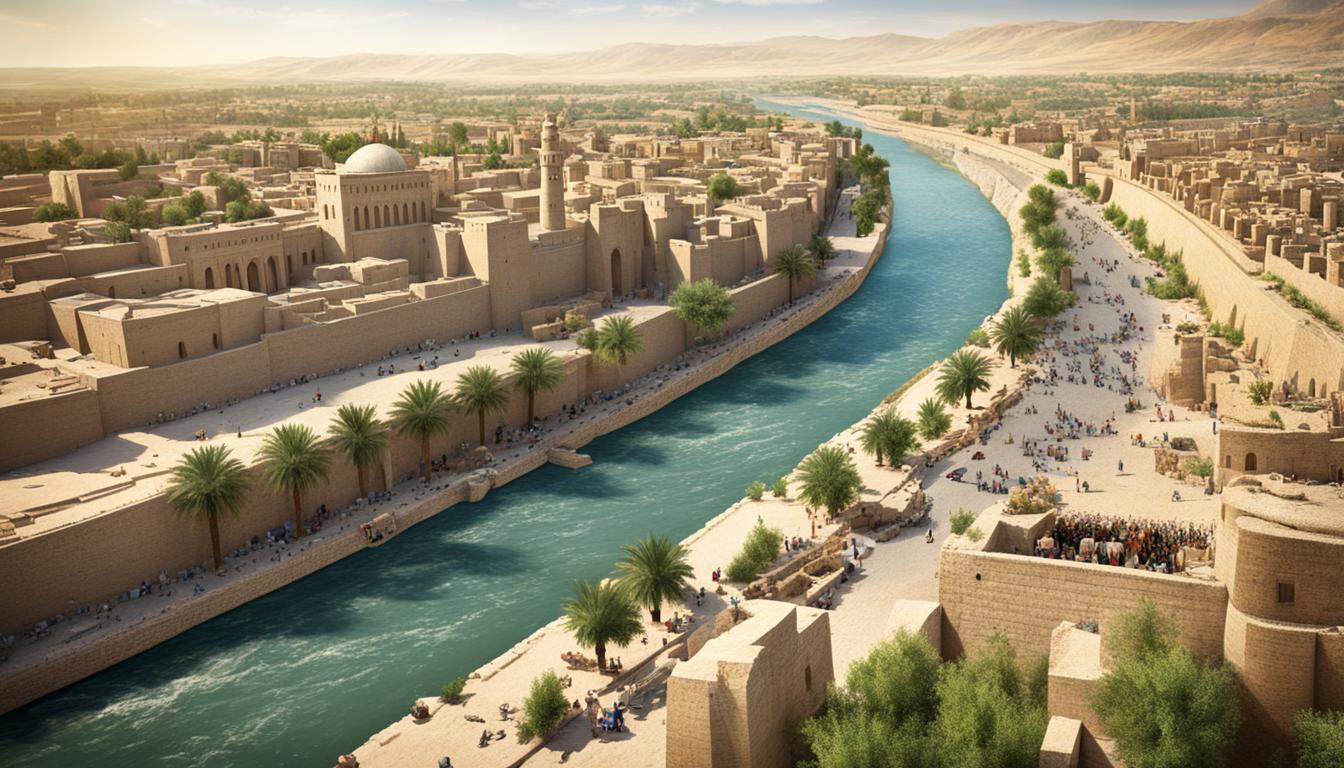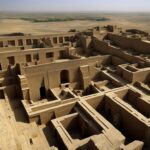The city of Nineveh holds great biblical significance and is mentioned in various books of the Bible. It is important to explore the historical, cultural, and theological aspects of Nineveh to understand its relevance in the biblical narrative.
In the Old Testament, Nineveh is prominently featured in the books of Jonah and Nahum, offering insights into its history and significance. The mention of Nineveh in these biblical texts highlights its role as a powerful and influential city during ancient times.
Nineveh’s history in the Bible stretches back to the early pages of Genesis, where it is believed to have been founded by Nimrod. Throughout the biblical narrative, Nineveh’s prominence is evident in its conquests, architectural marvels, and cultural practices.
Key Takeaways:
- Nineveh plays a significant role in the biblical narrative, with references in various books of the Bible.
- The city was founded by Nimrod and grew to become a powerful and influential capital of the Assyrian Empire.
- Nineveh’s architectural wonders, cultural practices, and historical context provide valuable insights into ancient civilizations.
- Understanding the biblical significance of Nineveh enhances our understanding of the Old Testament and its teachings.
- The story of Nineveh serves as a reminder of the consequences of human actions and the importance of heeding divine warnings.
Historical Significance of Nineveh
Nineveh, the capital of the ancient Assyrian Empire, holds immense historical significance in the biblical narrative and the broader historical context of the Near East. This ancient city, founded by Nimrod according to Genesis, rose to prominence and played a pivotal role in shaping the political landscape and cultural development of the time.
With its towering conquests, grandeur, and military might, Nineveh established itself as a formidable power in the region. Its historical significance is evident not only in the biblical accounts but also in the annals of ancient history.
“Nineveh was a city of great historical significance, serving as the epicenter of the mighty Assyrian Empire. Its influence extended throughout the Near East, leaving a lasting impact on subsequent civilizations.”
The achievements of Nineveh and the Assyrian Empire are documented in various ancient texts, including the biblical narratives, inscriptions, and historical records. The city’s rise to power and its subsequent fall reveal the cyclical nature of civilizations and the enduring lessons learned from their histories.
Geographical Location of Nineveh
Nineveh, with its rich historical and biblical significance, was strategically located on the eastern bank of the Tigris River in what is now modern-day Iraq. This ancient city occupied a prominent position that facilitated its rise as a hub for trade and commerce, connecting various parts of the vast Assyrian Empire.
The proximity of Nineveh to the Tigris River was of utmost importance as it provided the city with easy access to water resources. This ensured the availability of drinking water, agriculture for sustenance, and transportation for both military purposes and trade. The river functioned as a lifeline for the city, offering a means for the exchange of goods and cultural influences, further enhancing Nineveh’s significance as a thriving urban center.
| Tigris River | Nineveh |
|---|---|
| One of the major rivers in the Middle East | An ancient city situated on the eastern bank of the Tigris River |
| Provides access to water resources for irrigation and agriculture | Enjoyed water resources and fertile land for agriculture |
| Significant for trade, transportation, and communication | Strategic location facilitated trade and communication throughout the Assyrian Empire |
| A source of economic prosperity | Thriving commercial center due to its access to the river |
The geographical context of Nineveh played a crucial role in shaping its historical and cultural development. Its accessibility and favorable location contributed to the economic prosperity and political power of the city, making it an influential force in the ancient world.
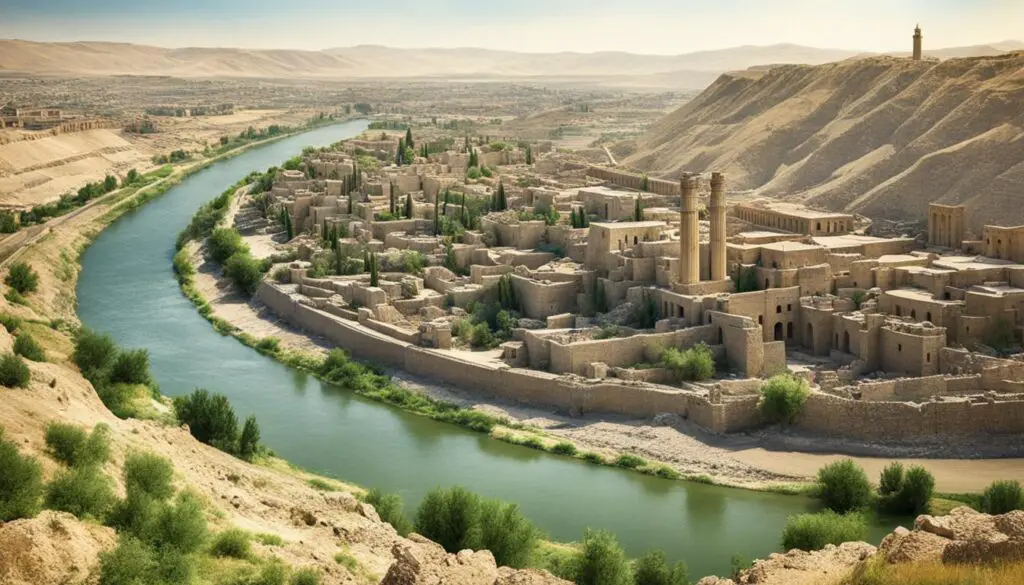
The Importance of the Tigris River
The Tigris River, flowing through the heart of Mesopotamia, served as a major transportation artery for ancient civilizations. Being one of the two great rivers of Iraq, it connected various regions and facilitated the exchange of goods, ideas, and cultural influences.
“The Tigris River played a crucial role in the development and prosperity of Nineveh, making it a prosperous center for trade, commerce, and cultural exchange.” – [Author Name]
Archaeological Discoveries in Nineveh
Excavations at Nineveh have unearthed fascinating artifacts that provide valuable insights into the ancient history of the city. These archaeological discoveries shed light on the daily life, art, and religious practices of the people who once called Nineveh home.
Among the remarkable findings are intricately carved reliefs that depict scenes of daily life, mythological figures, and military conquests. These reliefs showcase the skill and artistic prowess of the ancient Assyrians, offering a glimpse into their cultural achievements.
The excavations have also yielded clay tablets inscribed with cuneiform script. These tablets provide valuable information about the administrative and legal systems of Nineveh, as well as details about trade and commerce in the ancient city.
The remains of palace complexes and architectural structures have been unearthed during the excavations. These structures offer insights into the grandeur and sophistication of Nineveh’s architecture and urban planning.
In addition to physical artifacts, the excavations have uncovered evidence of religious practices in Nineveh. Temples and altars dedicated to various deities have been discovered, shedding light on the diverse religious beliefs and rituals of the ancient Assyrians.
| Archaeological Discoveries in Nineveh | Description |
|---|---|
| Intricately carved reliefs | Depictions of daily life, mythological figures, and military conquests |
| Clay tablets | Cuneiform inscriptions providing information about administration, law, and trade |
| Palace complexes and architectural structures | Remains highlighting the grandeur and urban planning of ancient Nineveh |
| Religious artifacts | Temples and altars revealing the diverse religious practices in Nineveh |
These archaeological discoveries in Nineveh offer a window into the past, enabling us to better understand and appreciate the rich history and cultural heritage of this ancient city.
Theological Themes in Nineveh
In the biblical narrative, Nineveh, the ancient city of the Assyrian Empire, is not only a historical and cultural backdrop but also serves as a beacon for exploring theological themes relevant to our faith. Through the story of Jonah’s mission to Nineveh, we encounter profound insights into repentance, divine justice, and the mercy of God.
Repentance: A Path to Redemption
And the people of Nineveh believed God. They called for a fast and put on sackcloth, from the greatest of them to the least of them. (Jonah 3:5)
Jonah’s reluctant prophecy to the people of Nineveh conveyed God’s message of impending judgment and the opportunity for repentance. In response, the Ninevites embraced humility and turned away from their wickedness, acknowledging their need for God’s forgiveness. Their repentance not only saved the city from destruction but also demonstrated the power of sincere repentance and its potential for redemption.
Divine Justice: Consequences of Wickedness
And should not I pity Nineveh, that great city, in which there are more than 120,000 persons who do not know their right hand from their left, and also much cattle? (Jonah 4:11)
While Nineveh experienced a temporary reprieve due to the repentance of its inhabitants, its eventual destruction underscores the biblical lesson of divine justice. The city’s wickedness and disregard for God’s commands led to its downfall. This serves as a cautionary tale, reminding us of the consequences of immorality and the ultimate judgment of God that awaits those who persist in unrighteousness.
Mercy of God: Gracious Forgiveness
“But it displeased Jonah exceedingly, and he was angry. And he prayed to the LORD and said, ‘O LORD, is not this what I said when I was yet in my country?’” (Jonah 4:1-2)
Through Jonah’s personal struggle with God’s mercy toward Nineveh, we witness the complex interplay between divine justice and grace. Despite Jonah’s initial reluctance and anger, God patiently revealed His compassionate nature and willingness to forgive those who sincerely seek Him. This narrative emphasizes the boundless mercy of God, which extends even to an enemy like Nineveh, and encourages us to embody forgiveness in our own lives.
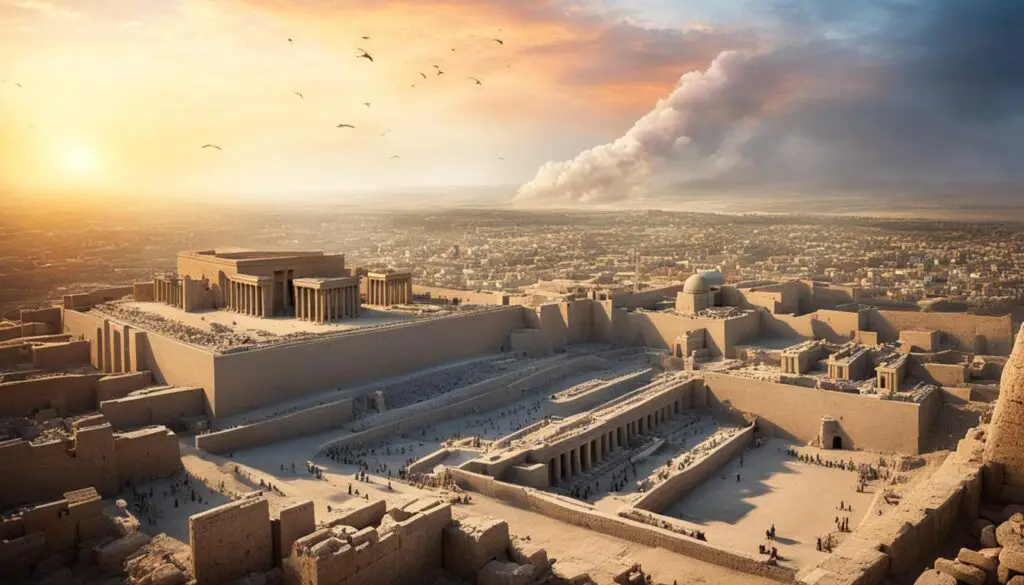
Key Biblical Events in Nineveh
Within the pages of the Bible, Nineveh serves as the backdrop for significant events that have shaped the biblical narrative. Two key events stand out: Jonah’s mission and Nahum’s prophecy.
Jonah’s Mission: A City Saved
In the Old Testament, the book of Jonah recounts the story of God’s call to the prophet Jonah to warn the people of Nineveh of their impending destruction. Reluctant at first, Jonah eventually obeyed and proclaimed God’s message of judgment to the city. Surprisingly, the people of Nineveh responded with genuine repentance from the king to the commoner. As a result, God relented from bringing disaster upon the city.
“And the people of Nineveh believed in God; they proclaimed a fast and put on sackcloth, from the greatest to the least of them.” – Jonah 3.5
Nahum’s Prophecy: The Fall of Nineveh
The book of Nahum, another prophetic work in the Old Testament, focuses on the impending judgment and destruction of Nineveh due to its wickedness. Nahum vividly describes the downfall of the city, emphasizing God’s righteous anger against their cruelty and idolatry. Despite being a powerful and feared city, Nineveh was unable to escape its fate as foretold by Nahum.
“And I will throw filth at you and treat you with contempt and make you a spectacle… I will make you a desolation and an object of reproach among the nations.” – Nahum 3.6, 7
These key biblical events not only demonstrate the interaction between God and the people of Nineveh but also highlight the themes of repentance, divine justice, and the mercy of God. They showcase the dynamic nature of the biblical narrative and the enduring impact of Nineveh’s presence in the Old Testament.
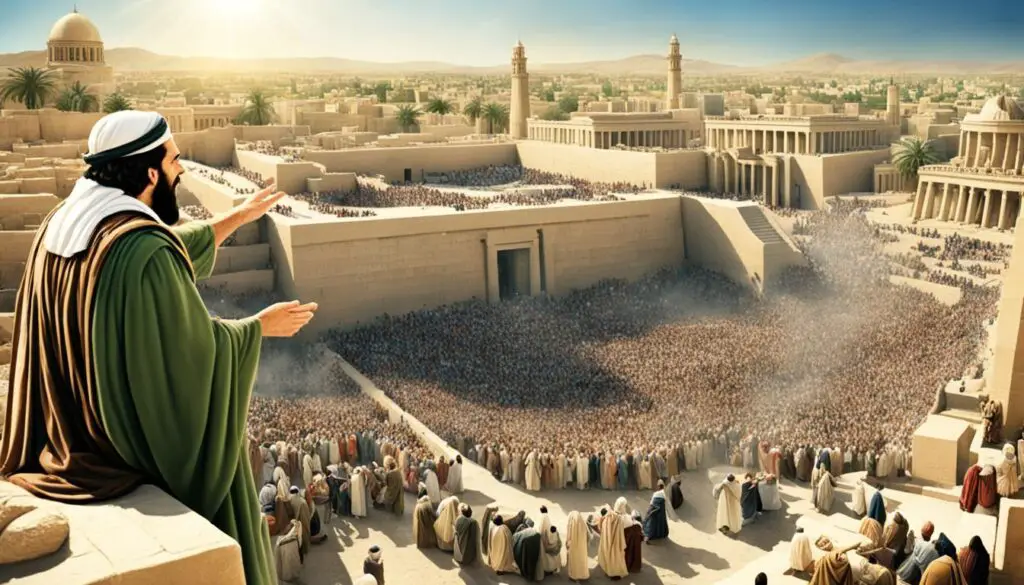
| Event | Biblical Reference |
|---|---|
| Jonah’s Mission | Book of Jonah |
| Nahum’s Prophecy | Book of Nahum |
Cultural and Religious Practices in Nineveh
The city of Nineveh, influenced by the vibrant Assyrian civilization, was known for its rich cultural practices and religious traditions. The people of Nineveh celebrated their heritage through grand palaces, bustling marketplaces, and elaborate festivals, showcasing the depth of their Assyrian culture.
One prominent aspect of Nineveh’s cultural practices was the worship of various deities. The city was home to a multitude of temples dedicated to different gods and goddesses. One such deity was Ishtar, the goddess of love and war. The worship of Ishtar played a significant role in the religious life of Nineveh, with offerings, prayers, and rituals dedicated to appeasing her.
Rituals and sacrifices were integral to the religious practices in Nineveh. The people believed in the power of these acts to communicate with the divine and maintain a harmonious relationship with the gods. Ceremonies involving animal sacrifices were performed to seek blessings, protection, and favor from the deities.
“The religious practices in Nineveh reflected the deep spiritual connection of its people with the divine. Through their rituals and sacrifices, they sought to honor the gods and gain their favor.”
Festivals held in Nineveh were an occasion for joyous celebrations and communal gatherings. The city came alive with music, dance, feasting, and processions during these festive events. One of the notable festivals was the Akitu festival, which marked the beginning of the New Year and involved various rituals to ensure prosperity and renewal.
The cultural and religious practices in Nineveh provide a glimpse into the vibrant and diverse society of ancient Assyria. These practices played a significant role in shaping the daily lives, beliefs, and values of the people who called Nineveh home.
Prophetic and Eschatological Significance of Nineveh
The prophecies of Nahum, Zephaniah, and other prophets reveal the prophetic and eschatological significance of Nineveh in biblical prophecy. These prophecies, inspired by God, foretold the judgment and downfall of Nineveh, portraying it as a symbol of human wickedness and God’s righteous justice. Through these prophecies, Nineveh serves as a cautionary tale, reminding humanity of the consequences of rebellion against God.
“Woe to the city of blood, full of lies, full of plunder, never without victims! The crack of whips, the clatter of wheels, galloping horses and jolting chariots! Charging cavalry, flashing swords and glittering spears! Many casualties, piles of dead bodies, countless dead, bodies without number—they stumble over the corpses!” – Nahum 3:1-3
The prophecies and their subsequent fulfillment stand as a testament to the accuracy and reliability of biblical prophecy. As the scriptures prophesied, the once mighty and powerful city of Nineveh met its downfall, just as God had declared.
The prophetic significance of Nineveh serves as a reminder that God’s justice will ultimately prevail, and those who persist in wickedness will face the consequences of their actions. It highlights the importance of repentance and turning back to God, for even a city as wicked as Nineveh had the opportunity for redemption when confronted with the truth.
The eschatological significance of Nineveh extends beyond its specific historical context. It points to the ultimate fulfillment of God’s plan for the world, where all nations and peoples will be held accountable for their actions. Through the prophecies concerning Nineveh, we are reminded of the certainty of God’s judgment and the need to align our lives with His will.
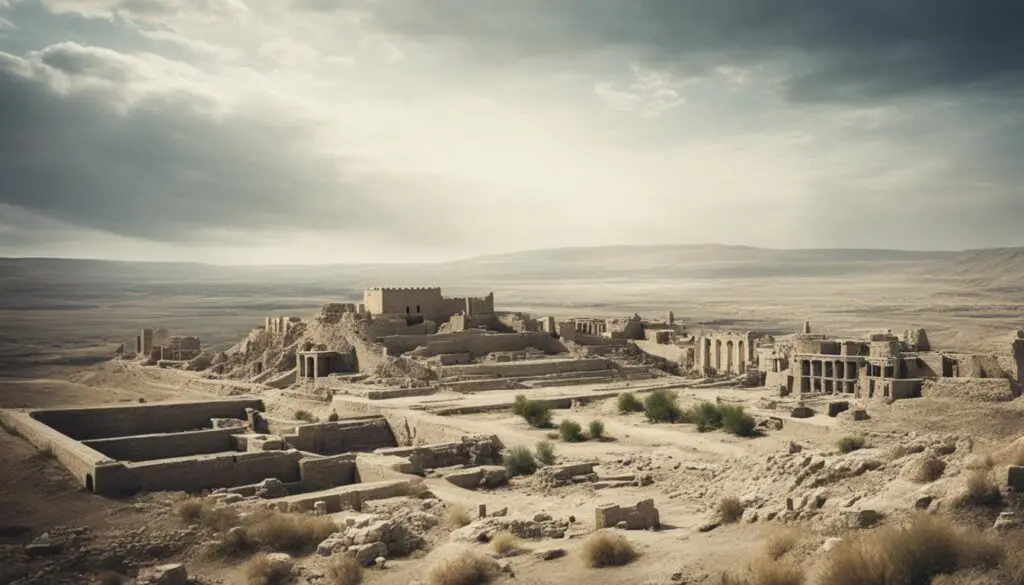
In summary, Nineveh’s prophetic and eschatological significance in biblical prophecy underscores the timeless truth that God’s justice and righteousness will ultimately prevail. It serves as a reminder of the consequences of wickedness and rebellion against God, while also pointing towards the hope of redemption and restoration through repentance and turning back to Him.
The Enduring Legacy of Nineveh
The legacy of Nineveh extends beyond its ancient existence. The enduring impact of this once-mighty city continues to captivate scholars, archaeologists, and individuals interested in biblical history. Through archaeological discoveries, biblical narratives, and the historical significance of Nineveh, its legacy resonates even in modern times.
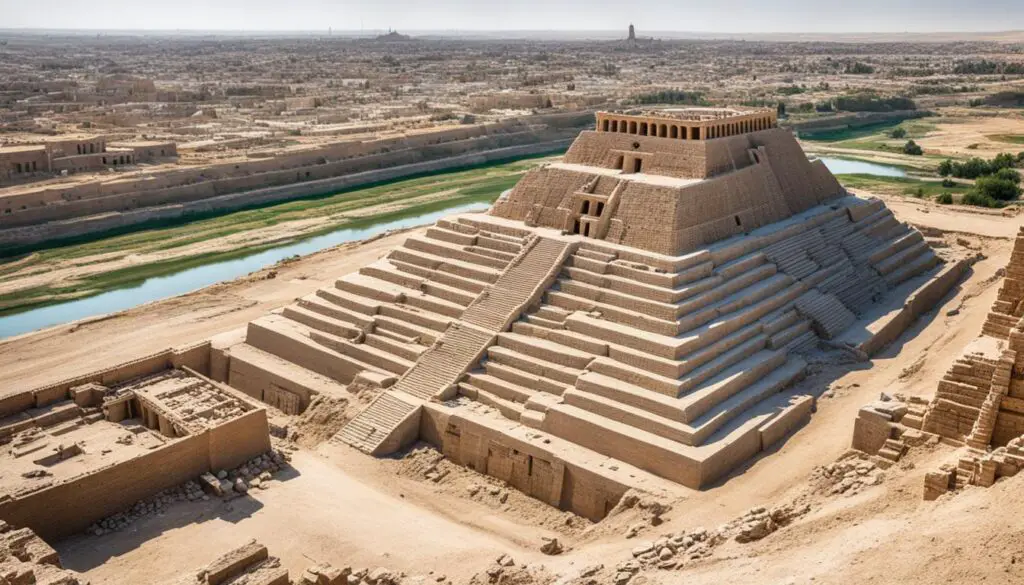
The archaeological findings from Nineveh provide valuable insights into the ancient world and contribute to our understanding of human civilization. Intricately carved reliefs, clay tablets with cuneiform inscriptions, and the remnants of grand palace complexes speak of a vibrant and sophisticated society that existed thousands of years ago.
The biblical narratives surrounding Nineveh, such as the story of Jonah and the city’s repentance, continue to inspire and offer lessons in faith, redemption, and divine mercy. The fall of Nineveh serves as a cautionary tale, highlighting the consequences of wickedness and the ultimate judgment of God.
Furthermore, the historical significance of Nineveh reminds us of the rise and fall of empires, the cyclical nature of power, and the enduring truths found within the pages of the Bible. It serves as a testament to the transitory nature of human achievements and the wisdom gained from examining the past.
In modern times, Nineveh’s legacy permeates various fields of study and cultural expressions. Scholars and researchers delve into its history to unravel mysteries and gain insights into the ancient world. The enduring influence of Nineveh is evident in literature, art, and even popular culture, where references to its grandeur and historical significance can be found.
In summary, the enduring legacy of Nineveh lies in its archaeological treasures, biblical narratives, and the profound lessons it offers. It serves as a reminder of the rise and fall of empires, the consequences of human actions, and the enduring truths found within the pages of the Bible.
Lessons from Nineveh
Nineveh, an ancient city of great biblical significance, offers valuable lessons that resonate with individuals and societies today. These lessons, derived from the biblical accounts and historical context of Nineveh, provide insights into faith, repentance, and the consequences of one’s actions.
The story of Jonah’s mission to Nineveh serves as a powerful lesson in the power of repentance, mercy, and redemption. Despite Jonah’s reluctance, the people of Nineveh heeded his warning and turned away from their wickedness, ultimately experiencing God’s forgiveness and salvation. This narrative emphasizes the transformative power of repentance and the boundless mercy of God, encouraging individuals to reflect on their own actions and seek reconciliation with both God and others.
“Then the word of the Lord came to Jonah a second time: ‘Go to the great city of Nineveh and proclaim to it the message I give you.’”
“The Ninevites believed God. A fast was proclaimed, and all of them, from the greatest to the least, put on sackcloth.”
“When God saw what they did and how they turned from their evil ways, he relented and did not bring on them the destruction he had threatened.”
The fall of Nineveh also provides a somber lesson regarding the consequences of disregarding God’s warnings and persisting in wickedness. Despite its once-glory as a powerful city, Nineveh’s arrogance, immorality, and refusal to repent led to its downfall. This serves as a reminder that no kingdom or individual is immune to the righteous judgment of God. It urges individuals and societies to examine their actions, cultivate righteousness, and strive for moral and ethical values in all aspects of life.
“Woe to the city of blood, full of lies, full of plunder, never without victims! The crack of whips, the clatter of wheels, galloping horses and jolting chariots!”
“Amid shouts, commanders with swords in their hands and myriads of victims, there is a great horde, a massive heap—and countless corpses; they stumble over the corpses… I will throw filth on you and treat you with contempt; I will make you a spectacle.”
Reflecting upon the history, prophecy, and theological themes surrounding Nineveh serves as a reminder of the enduring impact it has on faith and the human experience. The lessons gleaned from Nineveh prompt introspection, encourage spiritual growth, and inspire a humble pursuit of righteousness in a world filled with both the allure of sin and the divine call to redemption.
Conclusion
After delving into the rich historical, cultural, and theological significance of Nineveh in the Bible, it is evident that this ancient city holds a special place within the biblical narrative. From its prominent role in biblical narratives to the archaeological discoveries that shed light on its past, Nineveh weaves a complex tapestry that captivates scholars and individuals interested in biblical history.
The enduring legacy of Nineveh serves as a constant reminder of the eternal truths and lessons found within the pages of the Bible. The city’s rise and fall depict the consequences of human actions and the importance of heeding divine warnings. Through the story of Jonah’s mission, Nineveh teaches us about the power of repentance, mercy, and redemption.
As we explore Nineveh’s biblical significance, we are reminded of the lasting impact it has had on faith and the valuable lessons it offers. Whether it is understanding the theological themes of repentance and divine justice or reflecting on the consequences of wickedness, Nineveh invites us to examine our actions, seek righteousness, and humbly align our lives with God’s principles.
FAQ
Why is Nineveh significant in the Bible?
Nineveh holds great biblical significance and is mentioned in various books of the Bible. It was the capital of the ancient Assyrian Empire and played a crucial role in shaping the history of the Near East.
Where was Nineveh located?
Nineveh was situated on the eastern bank of the Tigris River in what is now modern-day Iraq.
What have archaeologists discovered in Nineveh?
Excavations at Nineveh have yielded remarkable discoveries, including intricately carved reliefs, clay tablets with cuneiform inscriptions, palace complexes, and architectural structures.
What theological themes are associated with Nineveh?
The biblical narrative surrounding Nineveh explores various theological themes, such as repentance, divine justice, and the mercy of God.
What key events took place in Nineveh?
Several key events in the Bible occurred in Nineveh, including Jonah’s mission, where the city repented and was spared destruction, and Nahum’s prophecy, which foretold the fall of Nineveh due to its wickedness.
What were the cultural and religious practices in Nineveh?
Nineveh was known for its grand palaces, bustling marketplaces, and the worship of various deities, including Ishtar, the goddess of love and war. Rituals, sacrifices, and festivals were an integral part of Nineveh’s cultural and religious life.
What is the prophetic significance of Nineveh?
The prophecies of Nahum, Zephaniah, and other prophets highlight Nineveh’s significance in the prophetic and eschatological context. These prophecies foretell the judgment and downfall of Nineveh, portraying it as a symbol of human wickedness and God’s righteous justice.
What is the enduring legacy of Nineveh?
The legacy of Nineveh extends beyond its ancient existence. The archaeological discoveries, biblical narratives, and historical significance of Nineveh continue to captivate scholars, archaeologists, and individuals interested in biblical history.
What lessons can we learn from Nineveh?
Nineveh provides valuable lessons for individuals and societies today, emphasizing the power of repentance, mercy, and redemption, as well as the consequences of wickedness and the importance of heeding God’s warnings.
Why is exploring Nineveh in the Bible important?
Exploring Nineveh in the Bible reveals its rich historical, cultural, and theological significance. It highlights the intricate tapestry of the biblical narrative and serves as a reminder of the eternal truths and lessons found within the pages of the Bible.
